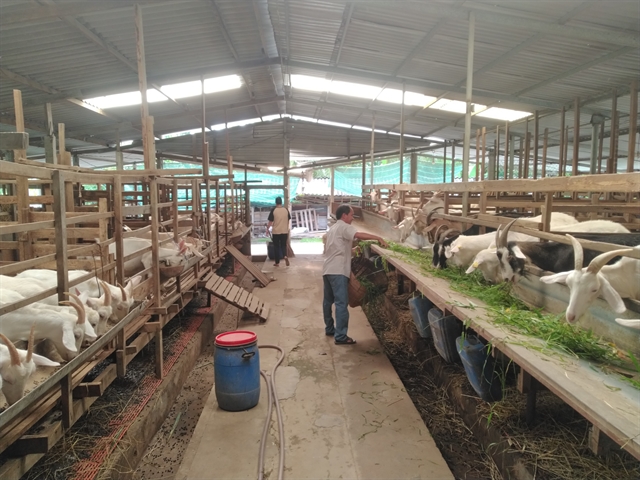Tiền Giang Province fosters agricultural co-operatives
Society – Economy - Ngày đăng : 08:00, 14/05/2024
Tiền Giang Province fosters agricultural co-operatives
Agricultural and fisheries co-operatives in the Cửu Long (Mekong) Delta province of Tiền Giang have developed strongly and attracted large numbers of members.
 |
| A goat farm belonging to the Đông Nghi Agricultural Co-operative in Tiền Giang Province’s Châu Thành District. The farm also offers tourism services and gets around 1,000 visitors a week. — VNA/VNS Photo Minh Hưng |
TIỀN GIANG — Agricultural and fisheries co-operatives in the Cửu Long (Mekong) Delta province of Tiền Giang have developed strongly and attracted large numbers of members.
They create jobs in rural areas, develop value chains and help members sell their produce.
Nguyễn Văn Tú, chairman of its Co-operative Alliance, said the province has 195 agricultural and fisheries co-operatives with nearly 45,000 members that have created nearly 2,300 jobs.
They earned revenues of more than VNĐ111.7 billion (US$4.6 million) so far this year, up 13.6 per cent year-on-year, he said.
They have collaborated with relevant agencies to boost agricultural and fishery extension activities and help their members apply advanced farming techniques, good agricultural practices (GAP) and organic standards.
They have linked up with companies to develop product value chains through which their members can buy farming inputs and get guaranteed outlets for their produce.
During the 2023-24 winter-spring crop, rice farming co-operatives linked up with companies to form large-scale rice fields covering a total area of 2,500ha and harvest an average of 7-7.2 tonnes per hectare.
They sold their rice to the companies at VNĐ600-900 a kilogramme higher than market prices to earn profits of VNĐ35-40 million ($1,400-1,600) per hectare.
Clean vegetable farming co-operatives in the province have tied up with supermarkets, collective kitchens and wholesale markets in the province and elsewhere.
Võ Minh Luân, director of the Phú Qưới Agriculture – Trade and Service Co-operative in Gò Công Tây District, said his co-operative has 130 members who grow vegetables on nearly 14ha to VietGAP standards and sell to supermarkets, collective kitchens and wholesale markets.
This has helped stabilise production and improve members’ incomes, he said.
The co-operative produces four tonnes of clean vegetables a day and its members earn an average of VNĐ8-9 million ($320-360) per 1,000sq.m per month, he said.
The Phú Tân Fisheries Co-operative in Tân Phú Đông District has more than 60ha of shrimp-rice farms that are highly productive and adapted to saltwater intrusion in the dry season.
Hà Văn Hải, its director, said the co-operative has tied up with companies to breed shrimp to biosafety standards and grow rice to GlobalGAP standards, and this has helped improve the average earning to VNĐ50-60 million ($2,000-2,400) per hectare annually.
“All members are well-off and no one is poor.”
Tiền Giang, the country’s largest fruit producing province, has 43 co-operatives that have grown 3,500 tonnes of fruits so far this year, mostly speciality ones such as Hoà Lộc mango, green skin and pink flesh grapefruit and durian.
The Cẩm Sơn Agricultural Services Co-operative in Cai Lậy District has linked up with farmers to develop production codes for thousands of hectares of durian in Cẩm Sơn Commune for export.
Production codes are a basis for official exports to China, he said.
Tú said to assist agricultural and fisheries co-operatives to improve their operative efficiency, the province plans to strengthen advocacy about the role of co-operatives.
The province is implementing a programme to support co-operatives in 2021-25 with support policies related to land, finance, infrastructure, trade promotion, and market expansion, he said.
It is assisting co-operatives with agricultural and vocational training, using technology, building growing codes, implementing origin traceability, applying digital technology in production management and produce sales.
It is expanding effective co-operative models that have value chains. — VNS
